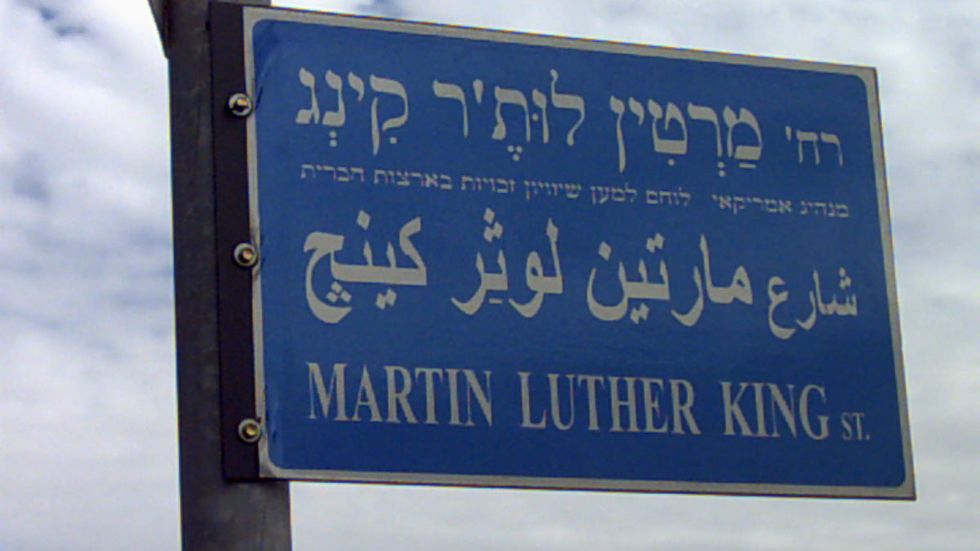
© 2024 Blaze Media LLC. All rights reserved.
As the most prominent leader of the 1960s American Civil Rights Movement, you would think that the Rev. Martin Luther King, Jr. had no time to explore what was happening outside of America’s borders, or even the movement he championed. But that’s not the Rev. King many had come to know.
Above perhaps any other international issue, King was known as a staunch supporter of the Jewish people’s right to self-determination. The reverend saw the Zionist movement to create the state of Israel as an inspiration to his own cause for equality back home.
Before his premature death and assassination, King increasingly made his views on Israel, the greater Middle East, and widespread anti-Semitism quite clear.
Israel: “One of the great outposts of democracy”
In 1967, the same year that Israel was attacked by the region’s Arab armies in the Six-Day War, King voiced support for Israel. “The whole world must see that Israel must exist and has a right to exist, and is one of the great outposts of democracy in the world,” he stated.
MLK wanted to travel to Israel
In correspondence between top Israeli officials and Rev. King, the two sides expressed deep and mutual reverence for their respective causes.
In a letter to Israeli Prime Minister Levi Eshkol, King said he was honored by the Israelis inviting him to their “wonderful country.” He also wrote to the Israeli ambassador in D.C., telling Amb. Avraham Harman that he was looking forward to planning a time to visit the Jewish state.
In a follow-up letter, King discussed his difficulty in finding time to visit due to the demands of the civil rights movement in the U.S. He did not want the Israel journey to be a quick layover, but instead, an unhurried and immersive experience in full.
Unfortunately, King did not have the opportunity to visit Israel, as he preferred to wait until stability returned to the nation following its war with surrounding Islamic armies. Sadly, Rev. King was assassinated on April 4, 1968, and he never got to see the country he admired so much.
“Peace for Israel means security, and we must stand with all our might to protect its right to exist.”
In 1968, just 10 days before his death, King was asked about the complexities of the Arab-Israeli conflict (before the term “Palestinian” was used to refer to the Arab people living in disputed lands). King explained his vision for Zion:
“Peace for Israel means security, and we must stand with all our might to protect its right to exist, its territorial integrity,” he said. “I see Israel as one of the great outposts of democracy in the world, and a marvelous example of what can be done, how desert land can be transformed into an oasis of brotherhood and democracy. Peace for Israel means security and that security must be a reality.”
On the Arab side, King recommended that the governments there focus on “economic security” and empowerment to bring them out of the third-world struggles of “hunger, of disease, of illiteracy.”
“As long as these conditions exist,” King said, “there will be tensions, there will be the endless quest to find scapegoats.”
Anti-Semitism is “wrong … unjust and it’s evil”
Rev. King constantly raised his voice against the mistreatment of Jews, stating: “I would still take a stand against anti-Semitism because it’s wrong, it’s unjust and it’s evil.”
King also understood the near-ubiquitous connection between anti-Zionism and anti-Semitism. During a civil rights dinner in 1968, when a student attacked the Zionist movement, King responded: “Don’t talk like that! When people criticize Zionists, they mean Jews. You’re talking anti-Semitism!”
The record is quite clear. Rev. Martin Luther King Jr. was a friend to the Jews, Israel, and the Zionist movement. And he was an enemy to anti-Semites and anti-Zionists alike.
Want to leave a tip?
We answer to you. Help keep our content free of advertisers and big tech censorship by leaving a tip today.
Want to join the conversation?
Already a subscriber?
more stories
Sign up for the Blaze newsletter
By signing up, you agree to our Privacy Policy and Terms of Use, and agree to receive content that may sometimes include advertisements. You may opt out at any time.
© 2024 Blaze Media LLC. All rights reserved.
Get the stories that matter most delivered directly to your inbox.
By signing up, you agree to our Privacy Policy and Terms of Use, and agree to receive content that may sometimes include advertisements. You may opt out at any time.